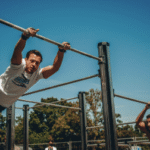Calisthenics Nutrition: Fuel Your Workouts
Nutrition plays a vital role in calisthenics, providing the fuel and building blocks necessary for optimal performance, recovery, and progress. Whether you’re a beginner or an advanced athlete, understanding the key principles of calisthenics nutrition can help you maximize your results and achieve your fitness goals. Here’s a detailed guide to fuel your calisthenics workouts:
Macronutrients: The Foundation of Your Diet
Protein:
Function: Essential for muscle repair, growth, and recovery. Provides the building blocks (amino acids) for muscle protein synthesis.
Sources: Lean meats, poultry, fish, eggs, dairy products, legumes, nuts, seeds, tofu, tempeh, and protein supplements (whey, casein, plant-based).
Intake: Aim for 1.6-2.2 grams of protein per kilogram of body weight per day, distributed evenly throughout your meals.
Carbohydrates:
Function: The primary source of energy for your workouts. Replenishes glycogen stores in muscles, which are depleted during exercise.
Sources: Whole grains (brown rice, quinoa, oats), fruits, vegetables, legumes, and starchy vegetables (sweet potatoes, potatoes).
Intake: Adjust your carbohydrate intake based on your training intensity and goals. Generally, aim for 40-60% of your total calories from carbohydrates.
Fats:
Function: A concentrated source of energy, supports hormone production, and aids in the absorption of fat-soluble vitamins.
Sources: Healthy fats include avocados, nuts, seeds, olive oil, fatty fish (salmon, mackerel), and coconut oil.
Intake: Aim for 20-30% of your total calories from healthy fats.
Micronutrients: Essential for Optimal Health and Performance
Vitamins and Minerals:
Function: Support various bodily functions, including energy production, immune function, bone health, and muscle function.
Sources: A balanced diet rich in fruits, vegetables, whole grains, and lean protein sources should provide most of the essential vitamins and minerals.
Key Micronutrients:
Vitamin D: Supports bone health, muscle function, and immune function.
Calcium: Crucial for bone health and muscle function.
Iron: Essential for oxygen transport and energy production.
Magnesium: Aids in muscle recovery and energy production.
B Vitamins: Important for energy metabolism and nerve function.
Hydration: A Key Factor in Performance
Water:
Function: Essential for regulating body temperature, transporting nutrients, and removing waste products. Dehydration can lead to decreased performance, fatigue, and muscle cramps.
Intake: Aim to drink at least 8-10 glasses of water per day, and more if you’re exercising intensely or in hot weather.
Electrolytes:
Function: Minerals that help maintain fluid balance and muscle function. Lost through sweat during exercise.
Sources: Electrolyte-rich drinks, coconut water, fruits, and vegetables.
Timing Your Nutrition
Pre-Workout:
Focus: Provide your body with energy for your workout.
Timing: Consume a meal or snack containing carbohydrates and protein 1-3 hours before your workout.
Examples:
Oatmeal with berries and almond butter
Greek yogurt with honey and banana
Whole-grain toast with avocado and egg
Post-Workout:
Focus: Replenish glycogen stores and provide protein for muscle repair and growth.
Timing: Consume a meal or snack containing carbohydrates and protein within 30-60 minutes after your workout.
Examples:
Grilled chicken with quinoa and vegetables
Protein smoothie
Salmon with sweet potato and asparagus
Supplements: Optional but Can Be Beneficial
Protein Powder: Can help you meet your daily protein requirements, especially if you struggle to get enough from food alone.
Creatine: Can enhance strength, power, and muscle mass.
BCAAs (Branched-Chain Amino Acids): Can help reduce muscle soreness and support muscle recovery.
Omega-3 Fatty Acids: Can reduce inflammation and support overall health.
Multivitamin: Can help fill any nutritional gaps in your diet.
Additional Tips for Calisthenics Nutrition
Prioritize Whole Foods: Focus on consuming whole, unprocessed foods, such as fruits, vegetables, whole grains, lean proteins, and healthy fats.
Limit Processed Foods and Sugary Drinks: These foods can provide empty calories and hinder your progress.
Listen to Your Body: Pay attention to your hunger cues and eat when you’re hungry. Adjust your food intake based on your training intensity and goals.
Meal Planning: Plan your meals and snacks in advance to ensure you’re getting the nutrients you need.
Stay Consistent: Consistency is key for achieving your nutrition goals. Make healthy eating a habit.
By following these guidelines and tailoring your nutrition to your individual needs and goals, you can fuel your calisthenics workouts, optimize your performance, and achieve the best possible results. Remember that nutrition is a key component of your calisthenics journey, so make it a priority and enjoy the benefits of a healthy and well-fueled body.

Calisthenics Nutrition: Fuel Your Workouts
Route
Calisthenics Gym Houston Functional Bodyweight Training
Secondary phone: (346) 483-3195
Email: info@calisthenicsclubhouston.com
URL: https://calisthenicsclubhouston.com/
Monday 6:00 AM - 7:00 PM Tuesday 6:00 AM - 7:00 PM Wednesday 6:00 AM - 7:00 PM Thursday 6:00 AM - 7:00 PM Friday 12:00 PM - 6:30 PM Saturday 9:45 AM - 12:00 PM Sunday 3:00 PM - 5:00 PM





